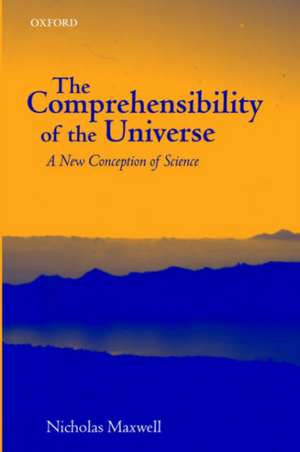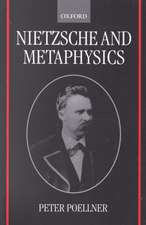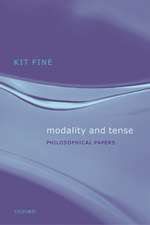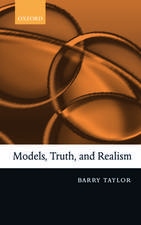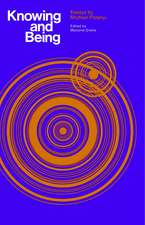The Comprehensibility of the Universe: A New Conception of Science
Autor Nicholas Maxwellen Limba Engleză Paperback – 16 ian 2003
| Toate formatele și edițiile | Preț | Express |
|---|---|---|
| Paperback (1) | 257.67 lei 31-37 zile | |
| OUP OXFORD – 16 ian 2003 | 257.67 lei 31-37 zile | |
| Hardback (1) | 361.65 lei 31-37 zile | |
| Clarendon Press – 15 oct 1998 | 361.65 lei 31-37 zile |
Preț: 257.67 lei
Preț vechi: 319.48 lei
-19% Nou
Puncte Express: 387
Preț estimativ în valută:
49.32€ • 50.82$ • 41.64£
49.32€ • 50.82$ • 41.64£
Carte tipărită la comandă
Livrare economică 19-25 februarie
Preluare comenzi: 021 569.72.76
Specificații
ISBN-13: 9780199261550
ISBN-10: 0199261555
Pagini: 332
Dimensiuni: 155 x 232 x 17 mm
Greutate: 0.46 kg
Ediția:Revised
Editura: OUP OXFORD
Colecția OUP Oxford
Locul publicării:Oxford, United Kingdom
ISBN-10: 0199261555
Pagini: 332
Dimensiuni: 155 x 232 x 17 mm
Greutate: 0.46 kg
Ediția:Revised
Editura: OUP OXFORD
Colecția OUP Oxford
Locul publicării:Oxford, United Kingdom
Recenzii
Nicholas Maxwell's ambitious aim is to reform not only our philosophical understanding of science but the methodology of scientists themselves . . . Maxwell's aim oriented empiricism [is] intelligible and persuasive . . . the main ideas are important and appealing . . . an important contribution to the philosophy of physics.
Maxwell . . . has shown that it is absurd to believe that science can proceed without some basic assumptions about the comprehensibility of the universe . . . Throughout his book, Maxwell has meticulously argued for the superiority of his view by providing detailed examples from the history of physics and mathematics . . . The Comprehensibility of the Universe attempts to resurrect an ideal of modern philosophy: to make rational sense of science by offering a philosophical program for improving our knowledge and understanding of the universe. It is a consistent plea for articulating the metaphysical presuppositions of modern science and offers a cure for the theoretical schizophrenia resulting from acceptance of incoherent principles at the base of scientific theory.
Maxwell has clearly spent a lifetime thinking about these matters and passionately seeks a philosophical conception of science that will aid in the development of an intelligible physical worldview. He has much of interest to say about the development of physical thought since Newton. His comprehensive coverage and sophisticated treatment of basic problems within the philosophy of science make the book well worth studying for philosophers of science as well as for scientists interested in philosophical and methodological matters pertaining to science.
Maxwell does not downplay the ambition of his project. His arguments are intended to do no less than change the nature of science by explicitly integrating metaphysics into scientific practice. Maxwell performs a heroic feat in making the physics accessible to the non-physicist . . . Philosophically, there is much here to stimulate and provoke. In particular, there are rewarding comparisons to be made between the functional roles assigned to Maxwell's metaphysical "blueprints" and Thomas Kuhn's paradigms, as well as between Maxwell's description of theoretical development and Imre Lakatos's methodology of scientific research programmes . . . those who share Maxwell's intuitions about progress, even those uncommitted to "theories of everything", will find encouragement here for thinking about how one does justice to such a possibility.
This admirably ambitious book contains more thought-provoking material than can even be mentioned here. Maxwell's treatment of the descriptive problem of simplicity, and his novel proposals about quantum mechanics deserve special note. . . . Maxwell's highly informed discussions of the changing ontologies of various modern physical theories are enjoyable, and the physical and mathematical appendix of the book should be a great help to the beginner.
The detailed discussions of theoretical unification in physics - from Newton, Maxwell and Einstein to Feynman, Weinberg and Salam - form some of the best material in the book . . . a beautiful balance between concrete science and abstract philosophy.
some of [Maxwell's] insights are of everlasting importance to the philosophy of science . . . My overall conclusion is that Universe is an ideal book for a reading group in philosophy of science or in philosophy of physics. Many of the pressing problems of the philosophy of science are discussed in a lively manner, controversial solutions are passionately defended and some new insights are provided; in particular the chapter on simplicity in physics deserves to be read by all philosophers of physics.
Maxwell . . . has shown that it is absurd to believe that science can proceed without some basic assumptions about the comprehensibility of the universe . . . Throughout his book, Maxwell has meticulously argued for the superiority of his view by providing detailed examples from the history of physics and mathematics . . . The Comprehensibility of the Universe attempts to resurrect an ideal of modern philosophy: to make rational sense of science by offering a philosophical program for improving our knowledge and understanding of the universe. It is a consistent plea for articulating the metaphysical presuppositions of modern science and offers a cure for the theoretical schizophrenia resulting from acceptance of incoherent principles at the base of scientific theory.
Maxwell has clearly spent a lifetime thinking about these matters and passionately seeks a philosophical conception of science that will aid in the development of an intelligible physical worldview. He has much of interest to say about the development of physical thought since Newton. His comprehensive coverage and sophisticated treatment of basic problems within the philosophy of science make the book well worth studying for philosophers of science as well as for scientists interested in philosophical and methodological matters pertaining to science.
Maxwell does not downplay the ambition of his project. His arguments are intended to do no less than change the nature of science by explicitly integrating metaphysics into scientific practice. Maxwell performs a heroic feat in making the physics accessible to the non-physicist . . . Philosophically, there is much here to stimulate and provoke. In particular, there are rewarding comparisons to be made between the functional roles assigned to Maxwell's metaphysical "blueprints" and Thomas Kuhn's paradigms, as well as between Maxwell's description of theoretical development and Imre Lakatos's methodology of scientific research programmes . . . those who share Maxwell's intuitions about progress, even those uncommitted to "theories of everything", will find encouragement here for thinking about how one does justice to such a possibility.
This admirably ambitious book contains more thought-provoking material than can even be mentioned here. Maxwell's treatment of the descriptive problem of simplicity, and his novel proposals about quantum mechanics deserve special note. . . . Maxwell's highly informed discussions of the changing ontologies of various modern physical theories are enjoyable, and the physical and mathematical appendix of the book should be a great help to the beginner.
The detailed discussions of theoretical unification in physics - from Newton, Maxwell and Einstein to Feynman, Weinberg and Salam - form some of the best material in the book . . . a beautiful balance between concrete science and abstract philosophy.
some of [Maxwell's] insights are of everlasting importance to the philosophy of science . . . My overall conclusion is that Universe is an ideal book for a reading group in philosophy of science or in philosophy of physics. Many of the pressing problems of the philosophy of science are discussed in a lively manner, controversial solutions are passionately defended and some new insights are provided; in particular the chapter on simplicity in physics deserves to be read by all philosophers of physics.
Notă biografică
Nicholas Maxwell is Emeritus Reader in Philosophy of Science at the University of London.
